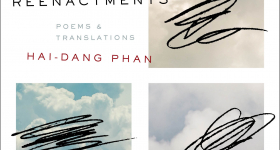Before I began the book, I came across an article Matthew Salesses wrote for the Rumpus. Aptly entitled “The Weight of the Future, the Emptiness of the Past”, Salesses provides a poignant reflection on how profoundly he feels his own experience as an adoptee affects his fatherhood -- namely, the inability to inform his daughter of genetic predispositions. I could feel his worries, pain, sense of loss leap out of the screen towards me one sentence at a time. His talent for conveying emotion was obvious and I believed this was a going to be one of his defining marks as a writer.
Written in terse impressionistic prose, Salesses’ debut novel takes on the tremendous endeavor of recreating the making and the aftermath of a flood. Like the haunting echoes of a dream, the story swirls back and forth in time, space, and memories, creating a nonlinear storyline that shows us the inescapability and instability of the past. Reminiscent of Chang Rae Lee’s Native Speaker, the novel possesses a melancholy and emptiness, one that is easily understood by anyone who’s felt lost and disconnected from their histories and sense of self while floating through life in white America. Salesses unveils this to us through Tee, a twenty-two-year-old Korean adoptee.
Set in the wake of 9/11, the story opens with the suicide of Tee’s uncle. To escape the chaos his family descends into, Tee decides to skip his final semester at Boston College to escape abroad instead. He chooses Prague, a city “that valued anonymity, the desire to be to be no one and someone at once” to build a new identity. In this old country brimming with ghosts and myths, Tee quickly befriends Pavel Picasso, a painter renowned during Czechoslovakia’s Velvet Revolution, his captivating wife Katka, and his friend with an American name, Rockefeller. As the city prepares itself for a flood that occurs every one hundred years, Tee finds himself inextricably entangled with the lives of the three Czechs.
Salesses has incredible clarity in vision and message. Every chapter, every section mimics the flood, from its ominous loom to its inevitable arrival, all of it directs us towards its disastrous culmination. Masterfully using this flood, we’re given insight into the turbulent undercurrents ravaging Tee’s life as he struggles with his place in the world, with his adoption and his family’s past. Through this troubled protagonist, Salesses paints for us the mess of growing up and reflects back the swelling confusion and persistent invisibility that lace our experiences as Asian Americans. Unapologetic in his dealings with difficult subject matters, Salesses takes care not to serve them heavy-handedly.
The real star of the novel, though, is the lyrical, poetry-like prose. Salesses is exceptional at crafting elegantly simple sentences that pierce, with striking impact and precision, the heart of his characters’ experiences and often times our own: “Maybe Tee could only ever belong to Prague as a foreigner, as the one Asian in the entire city, someone with another self waiting in the wings.”
But while the prose was often exquisite, its hird-person narration tended to distance the reader from the events and swing the tone into indifference. It often felt as though someone was giving a blasé report of factual observations. This, unfortunately, also colored my reactions towards the characters. While I appreciate how Salesses unabashedly embraced the characters’ imperfections, they seemed unnecessarily magnified under the (strangely) callous account and heightened my antipathy. This emotional detachment surprised me, especially in light of the affecting article regarding his adoption.
However, there were two moments when I experienced something stronger than the melancholy and emptiness that drifted atop the novel. One was the climax just after the titular flood, when the waters had swallowed the city and was spitting back junk and chaos. The other was at the very end, when I finally saw Tee for who he’s been all along. Those two instances moved me to see the characters with compassion, and changed my interpretation of the book on the second read, although I still didn’t feel the intensity of emotion I had been hoping for.
It is obvious Salesses poured his heart and soul into the work. In the acknowledgements, he even mentions that he’s worked on the novel for ten years. In that decade of labor, he certainly perfected his prose and mastered his use of the literary elements. Maybe it was in this strenuous pursuit of literary and structural perfection that he wrote out all the rawness and deeply personal emotions that come with such a story, especially one about a flood. While the story ultimately falls short of an emotional outpour, he does manage to paint a surreal but aggressively realistic portrait of the arduous journey to self-acceptance transnational adoptees can endure. And we should honor this haunting story. He is doing the work of telling an undervalued tale, one that’s not told nearly enough in our own literary landscape.










Comments